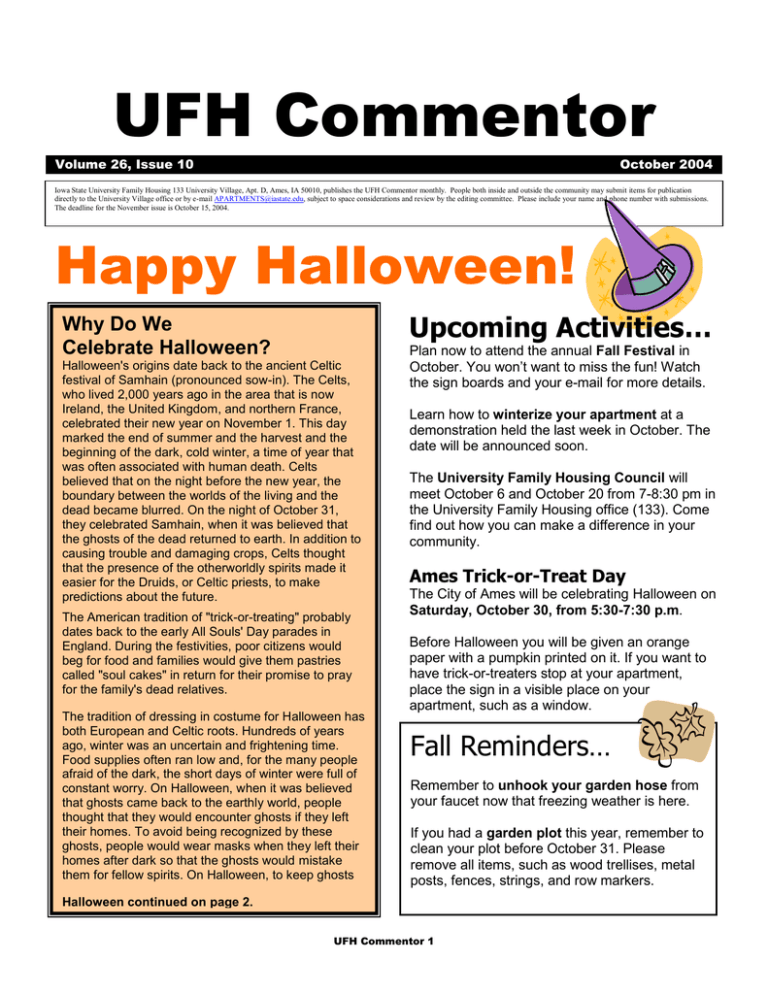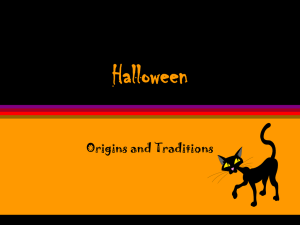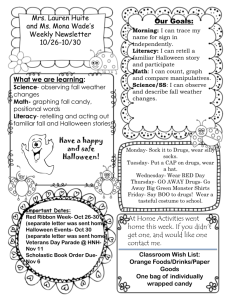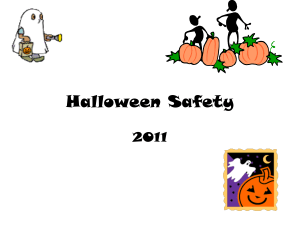UFH Commentor
advertisement

UFH Commentor Volume 26, Issue 10 October 2004 Iowa State University Family Housing 133 University Village, Apt. D, Ames, IA 50010, publishes the UFH Commentor monthly. People both inside and outside the community may submit items for publication directly to the University Village office or by e-mail APARTMENTS@iastate.edu, subject to space considerations and review by the editing committee. Please include your name and phone number with submissions. The deadline for the November issue is October 15, 2004. Happy Halloween! Upcoming Activities… Why Do We Celebrate Halloween? Halloween's origins date back to the ancient Celtic festival of Samhain (pronounced sow-in). The Celts, who lived 2,000 years ago in the area that is now Ireland, the United Kingdom, and northern France, celebrated their new year on November 1. This day marked the end of summer and the harvest and the beginning of the dark, cold winter, a time of year that was often associated with human death. Celts believed that on the night before the new year, the boundary between the worlds of the living and the dead became blurred. On the night of October 31, they celebrated Samhain, when it was believed that the ghosts of the dead returned to earth. In addition to causing trouble and damaging crops, Celts thought that the presence of the otherworldly spirits made it easier for the Druids, or Celtic priests, to make predictions about the future. The American tradition of "trick-or-treating" probably dates back to the early All Souls' Day parades in England. During the festivities, poor citizens would beg for food and families would give them pastries called "soul cakes" in return for their promise to pray for the family's dead relatives. The tradition of dressing in costume for Halloween has both European and Celtic roots. Hundreds of years ago, winter was an uncertain and frightening time. Food supplies often ran low and, for the many people afraid of the dark, the short days of winter were full of constant worry. On Halloween, when it was believed that ghosts came back to the earthly world, people thought that they would encounter ghosts if they left their homes. To avoid being recognized by these ghosts, people would wear masks when they left their homes after dark so that the ghosts would mistake them for fellow spirits. On Halloween, to keep ghosts Plan now to attend the annual Fall Festival in October. You won’t want to miss the fun! Watch the sign boards and your e-mail for more details. Learn how to winterize your apartment at a demonstration held the last week in October. The date will be announced soon. The University Family Housing Council will meet October 6 and October 20 from 7-8:30 pm in the University Family Housing office (133). Come find out how you can make a difference in your community. Ames Trick-or-Treat Day The City of Ames will be celebrating Halloween on Saturday, October 30, from 5:30-7:30 p.m. Before Halloween you will be given an orange paper with a pumpkin printed on it. If you want to have trick-or-treaters stop at your apartment, place the sign in a visible place on your apartment, such as a window. Fall Reminders… Remember to unhook your garden hose from your faucet now that freezing weather is here. If you had a garden plot this year, remember to clean your plot before October 31. Please remove all items, such as wood trellises, metal posts, fences, strings, and row markers. Halloween continued on page 2. UFH Commentor 1 Community News Resident Manager Spotlight Halloween continued… away from their houses, people would place bowls of food outside their homes to appease the ghosts and prevent them from attempting to enter. Halloween was brought to the United States during the 1800s by the Scotch and Irish immigrants. In the late 1800s, there was a move in America to mold Halloween into a holiday more about community and neighborly get-togethers, than about ghosts, pranks, and witchcraft. At the turn of the century, Halloween parties for both children and adults became the most common way to celebrate the day. Halloween lost most of its superstitious and religious overtones by the beginning of the twentieth century. Verl and Dee Dee Long are the new resident managers in Schilletter Village. They live in apartment 8-C and are in charge of apartments 162-165 UV, 167-169 UV, 7-20 Schilletter. Verl and Dee Dee moved to Ames from Blairsville, Georgia, a small town in the Blue Ridge Mountains. Verl is studying higher education administration at Iowa State University and will finish his master’s degree in May. Verl and Dee Dee have two children. Their son, Austin, is two years old, and their daughter, Rose, is 12 months old. Verl and Dee Dee love to find good deals at garage sales. They also enjoy driving around Iowa and seeing the countryside, specifically the small communities. As a family, they enjoy playing games and meeting people from other countries and areas of the world. Dee Dee said, “I have really enjoyed getting to know the new residents, and we look forward to meeting all the residents in our area.” Check your heater now before the cold weather is here to stay. To make sure your heater is working properly, turn the thermostat up to a high temperature and verify that the heater is putting out warm air. Turn down the thermostat after you check the heater. If you have a problem with your heater, call the Service Center at 294-3322. Between 1920 and 1950, the centuries-old practice of trick-or-treating was also revived. Trick-or-treating was a relatively inexpensive way for an entire community to share the Halloween celebration. Today, Americans spend an estimated $6.9 billion annually on Halloween, making it the country's second largest commercial holiday. The article comes from “The History of Halloween” on www.thehistorychannel.com. Tips for Safe Trick-or-Treating To make sure your trick-or-treating is safe and fun, review the following tips: Go trick-or-treating while it is still light outside. Plan your route with your family and pick well lighted streets. Carry a flashlight and use reflective tape on your costume, so you can be easily seen. Cross streets at corners and avoid crossing between parked cars. If you must wear a mask, remove it while crossing the street. A mask can make it difficult for you to see clearly. Wait until you are home to sort, check, and eat your treats. UFH Commentor 2 Community News Harvest Recipes Top 10 ways to stay healthy under stress With the stress of the semester at full speed, here are some tips on reducing stress in your life: Roasted Summer Squash 1-1/2 pounds of yellow squash cut into large pieces (about 5 cups) ½ teaspoon vegetable oil ½ teaspoon paprika ¼ teaspoon salt ¼ teaspoon garlic powder ¼ teaspoon ground red pepper 1. Reduce caffeine intake. 2. Eat healthier food. 3. Don’t treat stress symptoms with stimulants (e.g. alcohol, sedatives). 4. Use dietary supplements wisely. Combine all ingredients in a zip-top plastic bag. Seal the bag, shake to coat the squash. Please the squash on a jelly roll pan coated with cooking spray. Bake at 450 degrees for 20 minutes. Stir the squash after 10 minutes. 5. Eat breakfast. 6. Drink plenty of water. 7. Make sleep a priority. 8. Be aware of your body (don’t attribute all physical and psychological problems to stress). 9. Walk daily. 10. Schedule medical and dental appointments regularly. Tomatoes, cucumbers, and squash are abundant at this time of year. If you are struggling with how to prepare yet another cucumber or tomato, try one of these recipes. Tomato and Avocado Salad 2 ripe avocados, peeled and sliced 1 medium onion, cut into wedges 2 large tomatoes cut into wedges 1 cup Italian salad dressing Lettuce leaves (optional) In a bowl, combine the avocados, tomatoes, and onion. Add salad dressing, and stir to coat. Chill for 20 to 30 minutes. Serve over lettuce. Marinated Cucumbers and Tomatoes Combine 1 cucumber (thinly sliced), 2 tomatoes (sliced), and ¼ cup vinaigrette. Cover and chill. Sprinkle with freshly ground pepper, if desired. Daylight Savings Time ends on October 31. Don’t forget to turn back your clock one hour. Graduating in December? Make sure you notify the University Family Housing office 45 days prior to your anticipated moving date. Call 294-5360 or stop by the housing office, located in 133 D University Village. UFH Commentor 3







